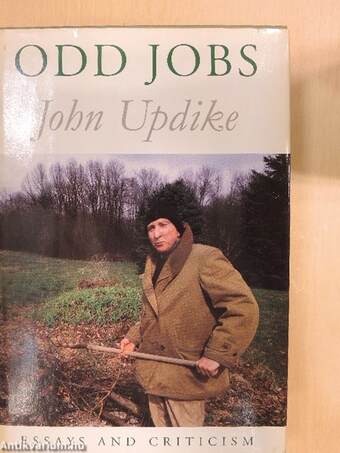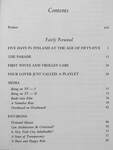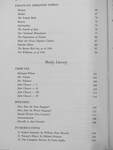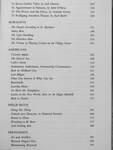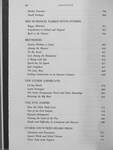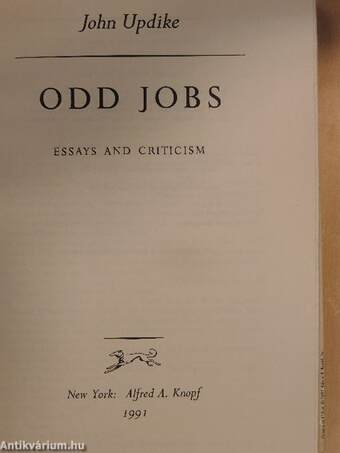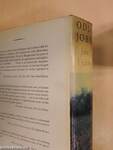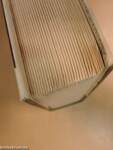1.067.317
kiadvánnyal nyújtjuk Magyarország legnagyobb antikvár könyv-kínálatát

VISSZA
A TETEJÉRE
JAVASLATOKÉszre-
vételek
Odd Jobs
Essays and Criticism
| Kiadó: | Alfred A. Knopf |
|---|---|
| Kiadás helye: | New York |
| Kiadás éve: | |
| Kötés típusa: | Félvászon |
| Oldalszám: | 919 oldal |
| Sorozatcím: | |
| Kötetszám: | |
| Nyelv: | Angol |
| Méret: | 24 cm x 17 cm |
| ISBN: | 0-679-40414-7 |
naponta értesítjük a beérkező friss
kiadványokról
naponta értesítjük a beérkező friss
kiadványokról
Fülszöveg
John Updike's fourth collection of non-íictional prose-following Assorted Prose (1965), Picked-Up Pieces (1975), and Hugging the Shore (1983)-is his biggest and richest yet. The years have brought him an increasing number of odd jobs, and he has coped with requests to elaborate upon our national monuments and the female body, the Fourth of July and the Gospel of Matthew, popular music and being on TV, Ben Franklin and Ted Williams. The opening section, titled "Fairly Personal," follows the essayist to Finland by air, to Boston by train, and, by proxy, to the idyllic small town of Hayesville, Pennsylvania; the importance of fiction, the mystery of architecture, and the relationship between first wives and trolley cars are all examined. The central section, "Mostly Literary," pays tribute to four older writers, introduces seven masterworks, ponders five moralists, and considers, with Updike's usual respectful attention and generosity of quotation, such authors as William Dean Howells,... TovábbFülszöveg
John Updike's fourth collection of non-íictional prose-following Assorted Prose (1965), Picked-Up Pieces (1975), and Hugging the Shore (1983)-is his biggest and richest yet. The years have brought him an increasing number of odd jobs, and he has coped with requests to elaborate upon our national monuments and the female body, the Fourth of July and the Gospel of Matthew, popular music and being on TV, Ben Franklin and Ted Williams. The opening section, titled "Fairly Personal," follows the essayist to Finland by air, to Boston by train, and, by proxy, to the idyllic small town of Hayesville, Pennsylvania; the importance of fiction, the mystery of architecture, and the relationship between first wives and trolley cars are all examined. The central section, "Mostly Literary," pays tribute to four older writers, introduces seven masterworks, ponders five moralists, and considers, with Updike's usual respectful attention and generosity of quotation, such authors as William Dean Howells, Bemard Shaw, Sherwood Anderson, Ernest Hemingway, Peter Taylor, Anne Tyier, Philip Roth, Róbert Pinget, Michel Tournier, Iris Murdoch, Umberto Eco, Cyril Connolly, Muriéi Spark, Gábriel García Márquez, Mario Vargas Llosa, Bruno Schulz, Yuri Trifonov, Vassily Aksyonov, Harry Mulisch, Peter Handke, and Thomas Bernhard. Novels from outposts of postmodernism like Turkey, Albania, Portugál, Israel, China, and Nigéria are reviewed, and biographies of, among others, Cleopatra and Dorothy Parker. A flurry of "hard facts"-aspects of science-ends this section, which is followed by an appendix of Updike's comments upon his own works and endeavors. Not since Henry James has an American novelist so faithfully and conscientiously taken on the duties of the critic. This collection's predecessor volume, Hugging the Shore, in 1984 won the National Book Critics Circle Award for criticism. VisszaTémakörök
- Idegennyelv > Idegennyelvű könyvek > Angol > Szépirodalom > Regény, novella, elbeszélés
- Idegennyelv > Idegennyelvű könyvek > Angol > Irodalomtörténet
- Irodalomtörténet > Irodalomelmélet > Irodalomkritika
- Szépirodalom > Regény, novella, elbeszélés > Az író származása szerint > Amerika > Amerikai Egyesült Államok
- Szépirodalom > Regény, novella, elbeszélés > Tartalom szerint > Esszék



